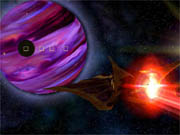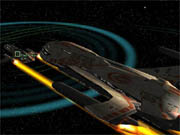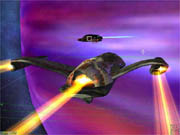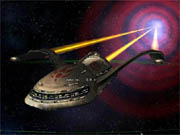Massively multiplayer online gaming has moved to outer space. DarkSpace, which was developed by small Texas-based developer PaleStar, is a persistent "offworld" epic that shifts many conventions of online role-playing games into science-fiction territory. The gameplay is fresh, innovative to a certain degree, and a real eye-opener for those who have grown tired of the swords and sorcery settings of EverQuest and its ilk. It is the perfect game for the jaded online game junkie who wants to trade in elves for aliens and that snazzy suit of magical plate mail for a starship.

Or at least it might be in a few months. Like so many massively multiplayer games that have been released in the past year, DarkSpace is unfinished. Despite a six-month beta-testing phase before the game went live on December 21 of last year, there are still a few noteworthy problems. Servers go down on occasion, resulting in data being reset and player progress being lost. Massive updates are a regular occurrence. The initial 35MB download (DarkSpace is only available as a free download at the official Web site) has already been augmented by at least another 20MB of data, indicating that PaleStar is cobbling things together as it goes, while still charging you $9.99 per month. At the same time, however, the company is demonstrating a desire to work out the kinks, and it's doing a lot more than just stomping bugs. Each major update has included some significant additions to gameplay, such as new units, rules, and other miscellaneous features, and there's much more on the drawing board. DarkSpace might not be a sci-fi gamer's dream yet, but it clearly has a lot of promise and bears close watching.
And it certainly isn't lacking in strong points now. PaleStar is putting great effort into developing a universe that's as compelling as those seen in TV space operas like the Star Trek shows and Babylon 5. To this end, the developer has created a complete future history. You begin play in the year 2140 as a member of one of three competing factions. The human United Galactic Trade Organization (UGTO) is the dominant power, having been established as sort of a one-world government over a century earlier, while its chief rival, the Interstellar Cultural Confederation (ICC), is fighting to establish an independent regime far from Earth. Adding to the intrigue is the K'Luth, an alien race targeting all humanity. There is a lot more to the narrative than these basics, of course. The complete story is well put together and intricately detailed, the sort of thing that inspires fan fiction.
This attention to detail is mirrored in the presentation quality of the background universe. Nearly every scene could have been clipped from a big-budget movie. Planets and moons rotate in front of their suns, causing halos and corona effects so striking that one of the major pleasures is rotating the camera to gaze at the scenery. The backdrop starfield and nebulae lend depth to this setting and provide an atmosphere of loneliness that one presumes to be the sole constant in the vacuum of space. Sparse audio accentuates this effect. There is no musical score, and you can only hear engines, weaponry firing, and the odd bit of radio chatter by zooming in close on a specific ship.

You get a chance to participate in the ongoing conflict by taking the helm of a starship. After choosing a power to align yourself with, you enter play as a lowly midshipman and choose a vessel to command. As is the norm in massively multiplayer games, you begin on the bottom rung of a very long ladder. Choices are limited to relatively impotent scouts, transports, and engineers in the beginning. There is a little room for variety in regard to what specific type of each class you'll pilot--for example, UGTO midshipmen get to pick from anti-sensor, bomber, and long-range variations of scout ships--so by and large you all start from the same lowly position. Ship types are roughly the same no matter which faction you represent. The UGTO and ICC vessels are even similar in appearance, sharing a standard cylindrical sci-fi design. K'Luth ships look completely different, more like living organisms than mechanical vessels. All craft are beautifully rendered, right down to damage effects that show up in combat.
Career advancement is determined by rank and the number of badges acquired. Promotions up through 12 levels of rank are governed by prestige points earned for such acts as destroying enemies and conquering planets and taken away for such acts as getting destroyed and colliding with planets. Also, according to the manual, prestige levels may be altered according to issues of "game balance" at any time.
Accumulated ship-specific achievements result in the awarding of gold, silver, and bronze badges. While rank and credits are generic throughout the game, badges are not. Damaging enemy ships earns you combat badges, dropping troops to capture planets is necessary to earn transport badges, landing bombs on enemy planetary structures is the requirement of the bomber badge, and so forth. You'll need to accomplish the specified task at least 25 times to earn a bronze badge, and often as many as 1,000 times to reach the gold plateau. Stars are given out for reaching certain levels in each of the six available badge classifications (combat, transport, bomber, engineering, support, and navigator). Earn a badge type across the board in bronze, silver, or gold and you'll get a star of the same type. Further medals are given for specific mixed accomplishments, such as the Star Fury medal for acquiring the silver badges for transport and bomber.

As specific badges are almost always needed to command each fleet's better starships, you need to pick an occupation and stick with it in order to prosper. In other words, if you want to move into the captain's chair of an ICC bomber dreadnought, which requires a gold bomber badge as a prerequisite, don't expect to get there by flying an engineering ship. This gives DarkSpace a strong role-playing element reminiscent of character classes, with ship types replacing fighters, clerics, and the like. However, there is a significant amount of freedom allowed, as ships are free to accept assignments that they might not be capable of handling. You don't always need to fly your transport as a transport, though your lack of serious weaponry makes it clear that you're no Millennium Falcon. Commanding some of the top ships in the game often requires experience with each of the ship types, meaning that you'll have to spend a lot of time developing careers with different vessels.
Because of all the many different ship types and classes, the gameplay in DarkSpace is multifaceted. Players are intended to work together in their respective factions and complement one another with the specific tasks of their vessels. One player might lead the way with his or her combat craft, supported by another player with a bomber, a third with a transport filled with troops, and yet one more with an engineering ship ready to make repairs. Ship operations are handled with an easy-to-use system that confines all movement controls to rudder keys and a velocity bar. Though you play in a 3D universe, you only have to worry about a two-dimensional plane of movement. A separate navigation screen is used to jump to different systems and planets. Combat leans to the traditional naval style of big bruisers circling one another instead of hit-and-run aerial dogfighting. Battles are almost always tense affairs, thanks in part to the emphasis on deliberate movements over reaction time and their usual proximity to planets. Weaving in and out between planets and moons while your computer shouts "Collision alert! Collision alert!" provides added drama.
The principal objective of most coordinated action is to conquer planets. There are six different types of planets, each of which features a particular resource that can be exploited. Terran planets, for example, can be used to house large populations, while barren ones are good for mining and gas planets and their inferno-class cousins are completely inhospitable. Nine types of buildings can be constructed on habitable planet types to enhance defense and the gathering of resources, which are turned into credits that can be used to buy ships. Planetary management is mostly automated, though revolts can occur. Get the right balance of food-producing hydro farms, mineral-producing mines, and fortification-ensuring barracks and defense bases and you can concentrate on the space elements of the game.

All these elements form an elegant whole that can be very captivating at times. There are some fundamental problems, though. For starters, technical issues make it hard to connect a fair chunk of the time. Getting booted from a server in mid-game is also a common occurrence, though DarkSpace is the picture of stability in comparison with some of its massively multiplayer rivals at the same early point in their development. More of an issue is a lack of players. The game design is also almost entirely dependent upon the interaction of human players, and they're in short supply at the moment. Little more than a handful of people can be found on each of the 20-or-so servers at a time. It might have been prudent to start off smaller, throwing all the factions onto one or two servers featuring just a couple of star systems. That way, there would been more bumping up against each other and greater player-to-player interaction. PaleStar has addressed this issue somewhat with the use of scenario servers that take place outside of the persistent world. Focused set pieces are provided there, giving players immediate goals to tackle. Still, as engaging as this sort of thing can be, it isn't what subscribers pony up 10 bucks a month for. It just whets your appetite more for what the "real thing" might evolve into. And some of the systems are still too large for the sparse populace. You can spend almost all your time racing from one planet to another, trying to find the two or three enemy players.
But make no mistake, the groundwork is being laid for DarkSpace to evolve into something special. If the technical issues can be worked out and the game can find a wider audience, it could become a worthy alternative to such hits as EverQuest and Dark Age of Camelot. Of course, those are some pretty big "ifs." The popularity problem might linger no matter how stable the game gets, especially if retail sales exposure isn't forthcoming. Still, the outstanding design is impressive enough to catch the attention of sci-fi nuts and anyone searching for an alternative to the typical massively multiplayer online RPG. That, plus the offer of a seven-day trial period, is more than enough reason to give this one a look.
Editor's note 02/08/02: The review originally stated that prestige points were awarded partly due to the number of times a player joins a server, which is incorrect. GameSpot regrets the error.